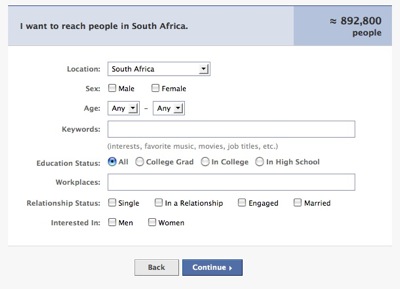I’ve been fairly cynical of some South African businesses’ recent forays into the world of social networking — specifically Facebook. It’s a helluva cluttered environment to play in, with an audience that ranges from 12 to 70, demographics from pink to purple and work sectors from rabbit hunting to banking. Cutting through that clutter takes some fairly deep strategic and creative thinking.
One-off campaigns, in my humble opinion, are doomed to fall victim to the noise.
I’ve asked this question before. How can you measure the success of a Facebook campaign? If it’s an application, do you measure total membership? Fans? Fan interaction? Engagement? Sales conversions? Or are we merely creating more empty online spaces for vacuous conversation?
In order to understand better the beast that is Facebook, I looked at its ad segmentation tool — the little app where you can drill down, “demographically” and geographically, into your required audience for the text/image ads displaying in news feeds and down the left column (old design).
The results are interesting and hopefully point us in the right direction — the direction of real business and brand interaction out of our social media sphere. If everything remains social, big businesses are going to continue to “dip in the big toe” as opposed to throwing serious money behind new web. Business. Brands. They have to find a way to sit alongside the social.

This is Facebook’s advertising target-audience creator application widget thing — it’s fairly nifty — and where the idea came from to delve a little deeper into South African representation within the world’s favourite noisy network.



The numbers were considerably higher than I would have thought, taking into account that these stats are pulled from what Facebook users choose to include on their profile. Only three or four months ago, the number of 450k South African Facebook users was being thrown around. Now, we’re almost at a million. That’s getting mighty close to 20% of our “connected” market. Exciting numbers for brands.




When you dig deeper, the inherent problems of a user-controlled profile begin to show their ugly anti-segmentation heads. Big-name brands, niche publishing communities and South Africa’s tech industry aren’t jumping up and down for these rifle-shot segments. Fashion, gay, lesbian, technology — the numbers take a big dip …

So, while Facebook remains a great place for poaching staff …

It remains difficult to target specific needs with pure contextual advertising campaigns. A beacon? Maybe not …
What’s the solution?
Social networking might not be conducive to precise targeting using traditional demographic and CRM models. But, if it’s proved anything, we now know that users in this sphere tend to congregate around valuable and relevant information, be it humorous, gaming or business.
I think the only way we’re going to cut through the clutter of social networks is to begin with the end in mind. Answer these questions:
- Why should someone come to your Facebook page?
- What value are you giving them?
- How will you keep them there?
- What is your long-term plan for engaging this “fan” base?
- How do you convert conversation into sales?
- How do you measure the quality of the conversation?
- What are your plans to deal with the “spillage” caused by unfocused international visitors?
I don’t have all the answers. But as we move closer and closer to the “semantic”, inter-relational web, it’s going to be more important to create an environment where you can continually engage users. You’ll always own your brand. The social network won’t be around forever — at least in its current form.
It’s about relationships at the end of the day. Use social networking where it makes sense, or we’re just going to have another “above the line” shotgun platform in a couple of years.


